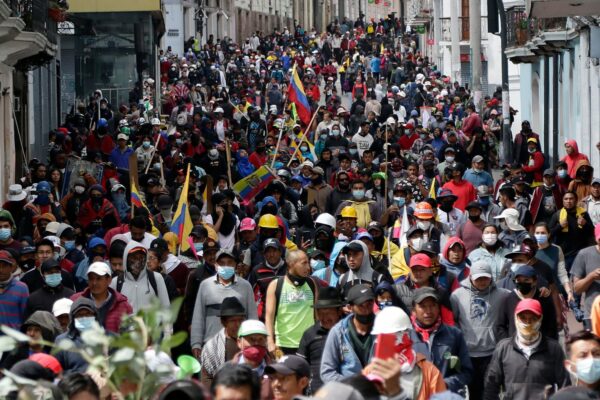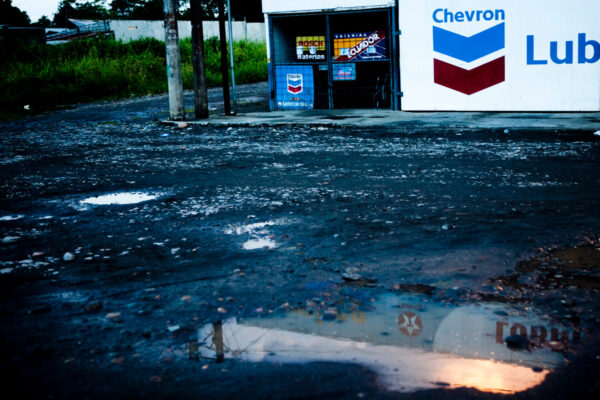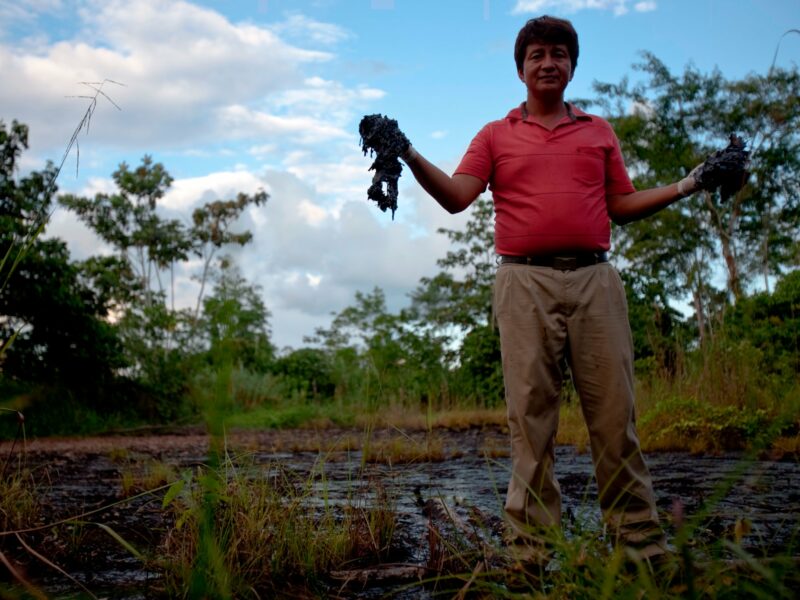Background
After filing a historic lawsuit in Lago Agrio, Ecuador, on May 7th, 2003, a 12-person delegation of indigenous leaders and campesinos – representing 30,000 rainforest peoples – traveled thousands of miles to ChevronTexaco’s hometown in San Ramon, CA to seek justice for the massive toxic dumping in the Amazon Rainforest committed by Texaco between 1971 and 1991.
The delegation of Amazonian leaders traveled by foot, canoe, bus, airplane and minivan to get to San Ramon. Some of the leaders had never left the Amazon, so all of the traveling was very difficult for them. The delegation was comprised of members of the Cofan, Siona, Secoya and Huaorani indigenous nationalities, 2 women from farming communities adjacent to former Texaco wells, toxic waste sites and separation stations; and 2 members of Frente de Defensa de la Amazonia (the Amazon Defense Front), a non-profit group in Ecuador’s Amazon that has been working with communities affected by Texaco’s operations for the last 9 years. The delegation was sponsored and organized by Amazon Watch.
Goals of the Delegation
The delegation came with the goals of raising awareness among community members in the San Ramon Valley and greater Bay Area, getting press coverage and meeting with ChevronTexaco’s CEO, David O’Reilly.
Although the delegation was not given the opportunity to meet with Mr. O’Reilly (after two requests and many days of standing outside of the company’s headquarters), they were welcomed with open arms by the residents and community leaders of the San Ramon Valley, Contra Costa County, community members in Richmond (also affected by Chevron) and NGO’s in the Bay Area. They also received a substantial amount of local, national and international press.
Success of the Delegation
Upon the arrival of the delegation to San Ramon on May 7th, we had no idea how we would all be received in the community, both the leaders from the Amazon and Amazon Watch. We didn’t know if people would even show up to our events and information sessions. We had hope, however, that the community residents of the San Ramon Valley would open their hearts and minds to what the leaders had to say and show their support in some way. Fortunately, they did and now there’s a local base of people that are informed and ready to act.
Here’s a summary of our success:
· Community residents and local leaders have agreed to start a local support group tentatively called “San Ramon Valley Cares About Ecuador”. This group will work with Amazon Watch to continue outreaching to San Ramon Valley residents about Texaco’s toxic legacy in Ecuador, put local pressure on ChevronTexaco to clean up Texaco’s mess, raise money for a clean up through bake sales and other fundraisers, hold informational sessions and, organize delegations to the rainforest with Amazon Watch. Currently, the group is planning a delegation of community leaders to the Ecuadorian Amazon.
· Several religious leaders, led by Rev. Steve Harms of Peace Lutheran Church in Danville and Rabbi Dan Goldblatt of Beth Chaim Congregation in Sam Ramon, lead a letter writing campaign to convince the company to meet with the Ecuadorians. The letter was signed by several members of the San Ramon Valley Interfaith Leaders Association and was also circulated by the Interfaith Council of Contra Costa County, which has 90 congregations as members.
· After hearing a testimony by Cofan leader, Toribio Aguinda at the City Council meeting, the delegation was invited to receive an official welcome by the Mayor and entire city council of San Ramon. Mayor H. Abram Wilson and the council members provided each member of the delegation pins with the city seal and t-shirts. Vice-Mayor Jerry Cambra and his wife, Colleen Cambra, also issued a statement supporting the group in their capacity as private citizens.
· The delegation also met with a total of 800 students during three assemblies at a local high school in San Ramon, and 50 students signed up to participate in a fact-finding delegation to the region where Texaco left its toxic legacy. Laura Mendua, a Cofan, was asked by some students why she wore a feather thru her nose. In turn, she asked them why some of the students wore body piercings.
· In the two weeks that the delegation was in the Tri-Valley area (and the greater Bay area), 500 signatures of support were collected at public events, religious services, meetings, and at shopping centers. The local group will continue gathering signatures and eventually will turn them into Mr. O’Reilly.
· After presenting information about Texaco in Ecuador and ChevronTexaco’s disrespect for the people in the Amazon, the Contra Costa Labor Council’s delegates overwhelmingly decided to support the demands of the affected peoples of Ecuador. A letter was written to CEO, David O’Reilly to express their concerns. The Contra Costa Labor Council represents approximately 85,000 working men and women in the county.
· At the final press conference outside the San Ramon Community Center on May, 22nd, the delegation and their supporters stood in front of a giant mobile billboard with a picture of Mr. O’Reilly and a burning oil waste pit. The billboard read, “ChevronTexaco: Clean Up Ecuador, Before Another Life is Lost”. Community residents carried signs that read, “ChevronTexaco, San Ramon Cares about Ecuador!”, while the members of the delegation expressed their gratitude. In addition, Rev. Steve Harms, Rabbi Dan Goldblatt, and Cheryl Brown (the Political Director of the Contra Costa Labor Council) spoke in support of the delegation’s concerns.
· Following the press conference on May 22nd, the delegation and its supporters marched a couple blocks to the World Headquarters of Chevron Texaco where they held a very colorful rally with signs, banners and giant puppets thanks to Art and Revolution, the Richmond Greens and the local residents. Supporters came from all over the Bay Area for this culminating event.
· The delegation received substantial press coverage and reports from local, national and international media outlets including: CTV Channel 30, the San Ramon Valley Herald, the Contra Costa Times, the Oakland Tribune, the San Francisco Chronicle, ABC Channel 7, KRON Channel 4, KCBS 74, KPFA 94.1, Univision, the Sacramento Bee, the New York Times, AP, Financial Times, NPR, El Comercio in Ecuador and the BBC London. To view some of these reports, log on to www.chevrontoxico.com.
Reflection by Leila Salazar, Campaign Organizer with Amazon Watch
I must say that a day does not go by that I think about the honor that we had in hosting this delegation. It is something that I will never forget and I’m sure they will never forget either.
The day the delegation arrived I was very nervous because Amazon Watch had never organized a delegation of this magnitude and importance. When we launched our campaign in December, for example, we sponsored the visits of 3 Amazonian leaders for one week. This was very different from what we did in May in many ways. Below are some of the ways:
· In May, we sponsored the visits of 12 leaders. 8 were indigenous. 4 were colonos, essentially people who had migrated to the Amazon from a different part of Ecuador. The difference was not just the size of the group, or the fact that some were indigenous and some were colono. 3 of the members of the Cofan tribe had never left the Amazon and did not speak Spanish. Luciano Lucitante is 70 years old. Laura Medua is 52 years old and Cecilia Lucitante is 29 years old. We had a deep responsibility to them. We had to be very conscious of what we introduced them to, of what we fed them, when we were speaking in Spanish and they couldn’t understand…of all of our actions. It was very challenging at times, because in one sense I wanted them to see the realities of our life here. I wanted them to see, the way of life (dependent on the automobile) that was destroying their homeland and their culture. Sometimes, however, I was so ashamed that I wanted to hide it, but it was impossible. It was impossible to hide the four lane freeways, and the huge shopping centers with hundreds of parking spaces, for example.
· Another significant difference with this delegation was that 4 of the representatives were women (2 indigenous and 2 colonas). This was very intentional. When we sent the invitation letters to the indigenous nationalities and the organizations in Ecuador, we asked that they consider women in the process because people here would also like to get the perspective from women as well. Cecilia Lucitante, Laura Mendua, Rosa Moreno and Mariana Jimenez were selected by their communities and nationalities to come to the United States to represent them. Originally, Rosa’s husband was going to come, but he encouraged her to come instead. As a nurse from the community of San Carlos, Rosa had so much to share about the effects of Texaco’s operations on her community. After living in the Oriente, the Ecuadorian Amazon, for 30 years, Mariana also had a lot to share about living next to Texaco’s first separation station. They were amazing spokeswomen! Because of the language barrier, Laura and Cecilia didn’t speak, but Laura sang and they both danced to share their culture. I will never forget Cecilia saying, “I never imagined being here. I have never participated in a meeting and I have never spoken at a meeting. Thank you for inviting me.” In response, I said, “Thank you for coming. Thank you for taking time away from your children and your families to be here”. This was, for all of these women, the first time away from their children. I remember Mariana saying, “If this wasn’t important…if this wasn’t a serious matter, we wouldn’t have left our families and come all this way to be here.”
· The other main difference was that we were not in San Francisco, where we have a base of support from other activists, concerned citizens and NGOs. We were in San Ramon, staying literally 1 block from ChevronTexaco’s World Headquarters in a hotel. The Homestead Suites, where we stayed was next to I-680 and across the street from a Chevron gas station. Upon our arrival to San Ramon, I had to explain to the delegation the significance of staying in San Ramon. Although they could not believe that no one was walking around like in the city, there were so many cars, or that it was “too” clean and organized, they understood why we had to stay where we did. After the outpouring of public support in the San Ramon Valley, including an invitation to a barbeque at a family’s home, they felt welcome. We all felt welcome.
Lastly, I just want to say that leading this delegation was a challenge and an honor. We had to challenge ourselves so many times with this delegation. I think the main challenge was remembering that our way of living was causing the destruction of the Amazon and the people who inhabit it. Every time I drove the leaders to an event in our rented minivans, I reminded myself of the privileges of western culture and our duties to act responsibly. It is our duty to question our privileges and take action in a peaceful way when we believe the actions of others, like huge multi-national corporations, are unjust.
The other challenge was reading the papers and seeing ChevronTexaco’s responses. They said statements, such as, “the allegations are completely false and baseless…Texaco conducted a clean up”. When I had to translate the responses to the delegation, they just couldn’t believe that this company would lie, so blatantly, to the press, its employees, and to its community. They wouldn’t let this bring them down, however, they just continued to share their stories with the hopes that they would be heard and that someday soon ChevronTexaco would be held responsible for what they did.
The delegation returned to Ecuador on May 23rd, 2003. They left very tired, after 2 and a half weeks of events, but they left in good spirits because of all of the support they had gained. They left knowing that we would continue to inform communities here, build more support and pressure ChevronTexaco.
I look forward to the next delegation!
Leila Salazar
ChevronToxico Campaign Organizer













